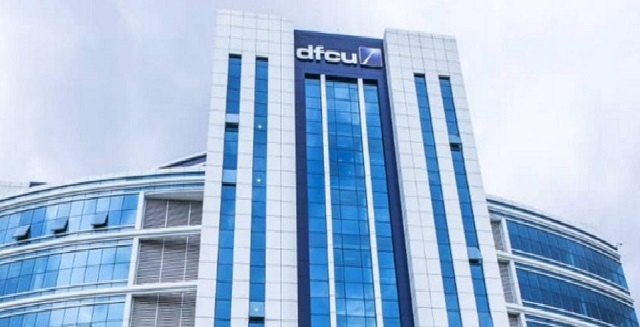
Ugandan lender sets sights on profitability top-tier as rivals Stanbic and Bank of Baroda stay ahead—for now
Kampala, Uganda | THE INDEPENDENT | In a banking sector still feeling the effects of cautious post-pandemic recovery and tighter monetary conditions, dfcu Bank has delivered a notable performance that signals a shift in strategy and confidence.
The lender reported a 151% surge in after-tax profit, reaching Shs 72 billion for the year ended 2024, up from Shs 28.6 billion in the previous year. Profit before tax more than doubled to Shs 79.2 billion, propelled by cost discipline, reduced credit impairment, and a leaner portfolio of non-performing loans.
The turnaround marks a departure from the sluggish performance of previous years and now positions dfcu as a serious contender among Uganda’s second-tier banks. Its return on equity climbed to 10% in 2024, a fivefold improvement from just 2% in 2021.
Yet, in absolute terms, dfcu still lags far behind the sector’s heavyweights. Stanbic Uganda, a subsidiary of the South African-based Standard Bank Group, posted a net profit of Shs 478bn for 2024, maintaining its position as the country’s most profitable bank. Bank of Baroda Uganda, another dominant player, reported Shs 133.95 billion in after-tax earnings, a 15% year-on-year increase that cemented its place in the top tier. While dfcu’s profit trajectory is steeper, it has some distance to cover before matching the scale and consistency of its larger rivals.
Still, the mood at dfcu is buoyant. Rebecca Birungi, the Group’s Acting Chief Financial Officer, attributed the bank’s improved fortunes to “a well-executed strategy of prudent risk management, targeted investments, and a customer-first approach.”
The bank’s net interest income rose by 4% to UGX 269.3 billion, while fees and commissions inched up by 2% to Shs 66.5 billion—evidence of a rebound in customer activity across both physical and digital channels. More impressive, however, was the dramatic reduction in non-performing assets, from 9.5% to just 4.4%, aided by robust recoveries and tighter credit risk oversight.
Reversal in impairment
Perhaps the clearest signal of a turnaround lies in the reversal of credit impairment charges. In 2023, dfcu recorded a Shs 82.7 billion hit from bad loans. In 2024, that swung to a Shs 12 billion gain, reflecting improved asset quality and recoveries—an anomaly in a region where rising interest rates and inflationary pressures have kept delinquencies elevated.
Yet performance has come at a cost. Operating expenses surged 18% to Shs 292.6 billion, as the bank doubled down on digital infrastructure, staff development, and legal costs. Capital adequacy ratios, however, remain robust: core capital stood at 29.1%, well above regulatory minimums, giving dfcu breathing room to pursue further growth.
The lenders Chief Executive Officer, Charles Mudiwa, is clear about the institution’s future trajectory. “We have moved past the refocus phase of our strategy and successfully reorganized our operations,” he said during the results briefing in Kampala last week.
“We are now in the transformation phase—rebuilding our technology, reimagining our processes, and reaffirming our values.”
The bank’s ambition, Mudiwa added, is to achieve a 20% return on equity by the end of 2025 and to enter the top five most profitable banks in Uganda by 2026—a bold target in a landscape dominated by multinationals with deep pockets and established market share.
Lined up investments
To this end, dfcu is investing heavily in what it calls “sector specialization”, focusing lending and services around key economic drivers such as agribusiness, small enterprise, and women-led ventures. Its Women in Business program and the GROW Fund have already disbursed Shs 11.2 billion to 212 beneficiaries across 30 districts and supported over 180,000 entrepreneurs with training and technical assistance.
In parallel, the rebranded dfcu Foundation is expanding its reach across Uganda’s agribusiness value chains. Last year, the Foundation supported 27,000 smallholder farmers and provided tailored assistance to 402 enterprises, more than half of which were women-led.
 The Independent Uganda: You get the Truth we Pay the Price
The Independent Uganda: You get the Truth we Pay the Price




